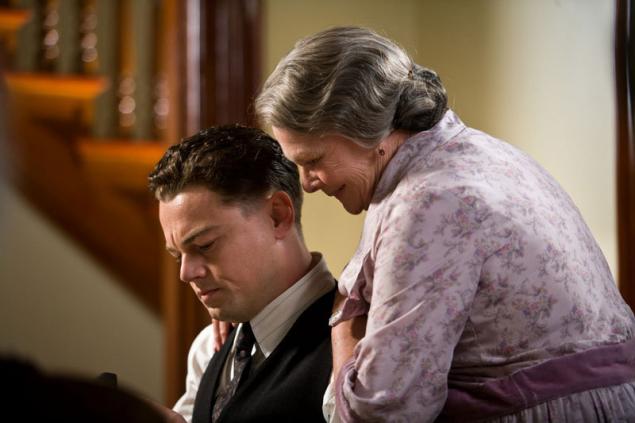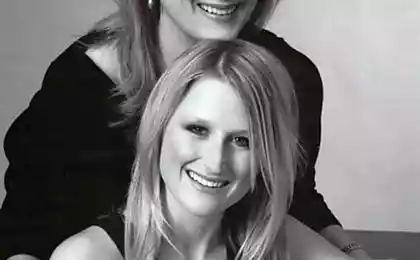1083
Strangulation love: love hurts like a domineering mother
Many are familiar with this system of relationships: an adult, but the infantile man who lives next to the "railway" mom. As there is such a connection and what is due to her appearance? How to create a role model of motherhood in the USSR and how it affects the lives of children today.
Strangulation love: a mother complex Jung
One of the first experts, talking about how parents' behavior affects the lives of children in terms of emotional development was Carl Gustav Jung - Swiss psychiatrist and founder of analytical psychology, and colleague of Sigmund Freud opponent. In his writings, he used the term "archetype", which allows to describe the phenomenon of the unconscious and the collective unconscious.

Dictionary of analytical psychology defines as the archetype of the "class of mental content that events do not have a separate source of the individual." These "archaic remnants" are the types of "carrying the properties of the whole of humanity as a whole", and in varying degrees, affect all of its representatives.
The archetype of the mother in the understanding of Jung has many aspects, and not always we are talking about the biological mother. "This is the mother or grandmother of a particular person, godmother, or in-law and mother-in-law, any woman with whom the person is in some respects, as well as a nurse, and the nurse," - lists the psychiatrist in his "Psychological aspects of the archetype of the mother," adding, that in the broader sense can be understood as a mother "church, university, city, country, sky, land, forest, sea».
Dysfunctional elements in relation to the "mother" of the native mother to his native country, can become the basis for the complexes that Jung and Jungian psychotherapists recognize and acknowledge the source of many psychological problems. Among them - the indecision, insecurities, immaturity, lack of a sense of "adulthood", stalking the presence of problematic scenarios interpersonal relationships, fears, conflicts and many other difficulties
. The basis of the whole of this, if it is indeed in the influence of the mother figure or the person who replaced her, is an unfinished process of emotional separation from her, which, on average, starts at three years, and in fact should be completed with the end of adolescence.
Merging together, why not let the child's mother
Women who have recently become mothers may seek to hold the baby "with you" more than it objectively required for a variety of reasons. In addition to increased anxiety and, as a result, concern for the health and the life of a son or daughter, the mother can feel a sense of anxiety for their own future, fear of loneliness or self isolation - including in cases where the spouse or partner living nearby, but the relationship with it does not seem satisfactory. With a baby on the hands can be "calmer", even if the rocking him no longer needed. In the same bed with a child sometimes, "sleep better", even when the appropriate term "move" it to a separate bed. Many women long accustomed to talk about the child's actions are not in the third person singular: "He went to school" - and in the first person plural: "We came to school»
. As a result of the separation process is inhibited, and aware of itself as a separate being a child becomes more difficult. For the mother the same sense of community with him and the ability to influence and make decisions becomes habitual, and leave it all in favor of independence is not easy forgotten. It plays a role, and that the 50-year-old mother of mature "child" is kind of like the young, and the 50-year-old woman, whose children have grown up and left home, seen as a man of the older generation.
Omnipotent mother: a triple load of Bolshevik
In the image of "the omnipotent mother", of course, there is the historical background. In XX century, in the framework of the Bolshevik model of a woman lying triple burden: it had to simultaneously work on a full-time, raise children, care for the home and help to elderly relatives. Family Law of the USSR in 1968 only strengthened this scheme, although it is in the 60 young mothers have the opportunity to stay with a child up to a year, which is slightly reduced degree of traumatic infantile experience of those born in the country people. And yet, according to family law, women were supposed to provide "the necessary social conditions for the combination of a happy mother with an increasingly active and creative participation in industrial and socio-political life." In other words - no breaks
. All of this laid the basis circulated today motherhood image as a combination of all conceivable within the family and social life responsibilities - as well as the basis of the fears related to the fact that to make such a load is difficult, and you have to pay for it by his youth, beauty, strength and personal time, a few years of a blossoming young man turning into a "roll up a woman." It is curious that from the men involved in the education of young children, housework and caring for older relatives is not formally required, and if it still comes up, all parts controlled by his wife, who could actually be the head of the family.
< br> Base model: generational trauma
How formed this view of the female gender role and motherhood at the state and community level? During the XX century, women in Russia more than once found themselves in dire straits. War, revolution and repression in the first place hit by men, so many had to raise their children alone. This led to the formation of public injury which describes in detail in his article "Injuries generations" Lyudmila Petranovskaya - family psychologist, one of the leading Russian experts in the field of family unit, permanent anchor Irsu training
. "Years go by, it is very difficult years, and a woman learns to live without a husband - says Lyudmila Petranovskaya. - A horse in a skirt. Baba with eggs. What are you like, the essence is. This man, who was carrying, carrying burdens, and used. I adapt. And differently is simply not able to. Many remember probably grandmothers, who just could not physically sit idle. Even little old at all, all were busy, all dragged bags, all trying to chop wood. It became a way to cope with life. (...) At the very least its expression, with the most terrible of circumstances a woman turned into a monster capable of killing their care. And it continues to be of iron, even if there has been such a need, even if then again lived with her husband and children out of danger. Like a vow fulfilled. (...) The worst thing in the diseased woman is not rude and authoritativeness. The worst thing - the love »
. Love "iron" mothers and grandmothers can cause emotional injury to a child, even if only for the sake of a child a woman becomes strong, survive and take care of it, no matter what.
Lyudmila Petranovskaya tells about the experience, which has survived as a child, one of her friends, whose mother and grandmother went through the siege of Leningrad. The girl fed broth, holding her head between her knees: she did not want and could not eat, but the family believed that "must", and crying daughter could not drown out for them, "the voice of hunger»
. Of course, not every case is so terrible. And yet, for women and for children, and for a man transformed model of motherhood has often uncomfortable and even painful. Moreover - for men do not always have a place in a system of relations, even if he is ready to "go back" or "to come»
. "The girl and the boy who grew up without fathers, create a family. They both are hungry for love and care, - says the psychologist. - They both hope to get them from a partner. But the only model of the family, known to them - a self-sufficient, "the woman with the eggs», which, by and large, do not need a man. That is great if there is, she loves him and everything. But really it for anything, not sewn mare's tail, rosette on the cake. (...) "Go away, I myself" - and stuff like that. And the boys, too, mothers are grown. Obey accustomed. Psychoanalysts would note further that with the father of my mother, and did not compete because the men themselves did not feel. Well, physically in the same house mother often he attended the wife or husband, or even both. But where to go? Come here to encourage men ... »
On the other hand, after the model of fatherhood historical catastrophes, not all was clear. Many of us are familiar with their own or other people's family stories about how his father, grandfather or great-grandfather left the family - voluntarily or as a result of violence - and never returned. Many of us know that the family is not destroyed, and even after the event was perceived as a matter of course - because of how common the phenomenon was
. "Many men felt quite natural that, leaving the family, they ceased to be her attitude, did not communicate with their children, did not help - says Petranovskaya. - I sincerely believed that nothing should "This hysterical", which remained with their child, and at some deep level, may have been right, because often women just yuzali them as inseminator and the children they needed, than men. So still the question of who owes whom. Resentment, which felt a man makes it easy to agree with his conscience and score, and if this was not enough, so here is because vodka is sold everywhere. »
End podkabluchnosti: separation from mother
It seems today, perceptions of parental responsibilities remain in the Russian society rather vague: "very difficult", "overwork", "too much responsibility", "sometime later". Women often fear of motherhood, and men do not want to think about the possibility of paternity. Not always, but often at the basis of these representations are collective trauma, learned in the family and society fears and unfinished process of emotional maturation and separation from the mother. Take a break of parent-child relationships, moving relationship with his mother to a new level, as an adult can be difficult. But it must be done - for the full value of their own lives and the lives of their relatives and for the opportunity to create their own relationship, with or without their children
. As with all major changes in the psychological field to the better podstupatsya not alone, but together with the therapist. Sessions will enable them to communicate with clearly outline the problem and the full list of the results and to solve it, find the right words and actions. Because ultimately the goal is not to destroy the relationship with too domineering or too worrisome mother, causing grave injury to himself and to her, and to just bring this relationship back in order.
Strangulation love: a mother complex Jung
One of the first experts, talking about how parents' behavior affects the lives of children in terms of emotional development was Carl Gustav Jung - Swiss psychiatrist and founder of analytical psychology, and colleague of Sigmund Freud opponent. In his writings, he used the term "archetype", which allows to describe the phenomenon of the unconscious and the collective unconscious.

Dictionary of analytical psychology defines as the archetype of the "class of mental content that events do not have a separate source of the individual." These "archaic remnants" are the types of "carrying the properties of the whole of humanity as a whole", and in varying degrees, affect all of its representatives.
The archetype of the mother in the understanding of Jung has many aspects, and not always we are talking about the biological mother. "This is the mother or grandmother of a particular person, godmother, or in-law and mother-in-law, any woman with whom the person is in some respects, as well as a nurse, and the nurse," - lists the psychiatrist in his "Psychological aspects of the archetype of the mother," adding, that in the broader sense can be understood as a mother "church, university, city, country, sky, land, forest, sea».
Dysfunctional elements in relation to the "mother" of the native mother to his native country, can become the basis for the complexes that Jung and Jungian psychotherapists recognize and acknowledge the source of many psychological problems. Among them - the indecision, insecurities, immaturity, lack of a sense of "adulthood", stalking the presence of problematic scenarios interpersonal relationships, fears, conflicts and many other difficulties
. The basis of the whole of this, if it is indeed in the influence of the mother figure or the person who replaced her, is an unfinished process of emotional separation from her, which, on average, starts at three years, and in fact should be completed with the end of adolescence.
Merging together, why not let the child's mother
Women who have recently become mothers may seek to hold the baby "with you" more than it objectively required for a variety of reasons. In addition to increased anxiety and, as a result, concern for the health and the life of a son or daughter, the mother can feel a sense of anxiety for their own future, fear of loneliness or self isolation - including in cases where the spouse or partner living nearby, but the relationship with it does not seem satisfactory. With a baby on the hands can be "calmer", even if the rocking him no longer needed. In the same bed with a child sometimes, "sleep better", even when the appropriate term "move" it to a separate bed. Many women long accustomed to talk about the child's actions are not in the third person singular: "He went to school" - and in the first person plural: "We came to school»
. As a result of the separation process is inhibited, and aware of itself as a separate being a child becomes more difficult. For the mother the same sense of community with him and the ability to influence and make decisions becomes habitual, and leave it all in favor of independence is not easy forgotten. It plays a role, and that the 50-year-old mother of mature "child" is kind of like the young, and the 50-year-old woman, whose children have grown up and left home, seen as a man of the older generation.
Omnipotent mother: a triple load of Bolshevik
In the image of "the omnipotent mother", of course, there is the historical background. In XX century, in the framework of the Bolshevik model of a woman lying triple burden: it had to simultaneously work on a full-time, raise children, care for the home and help to elderly relatives. Family Law of the USSR in 1968 only strengthened this scheme, although it is in the 60 young mothers have the opportunity to stay with a child up to a year, which is slightly reduced degree of traumatic infantile experience of those born in the country people. And yet, according to family law, women were supposed to provide "the necessary social conditions for the combination of a happy mother with an increasingly active and creative participation in industrial and socio-political life." In other words - no breaks
. All of this laid the basis circulated today motherhood image as a combination of all conceivable within the family and social life responsibilities - as well as the basis of the fears related to the fact that to make such a load is difficult, and you have to pay for it by his youth, beauty, strength and personal time, a few years of a blossoming young man turning into a "roll up a woman." It is curious that from the men involved in the education of young children, housework and caring for older relatives is not formally required, and if it still comes up, all parts controlled by his wife, who could actually be the head of the family.
< br> Base model: generational trauma
How formed this view of the female gender role and motherhood at the state and community level? During the XX century, women in Russia more than once found themselves in dire straits. War, revolution and repression in the first place hit by men, so many had to raise their children alone. This led to the formation of public injury which describes in detail in his article "Injuries generations" Lyudmila Petranovskaya - family psychologist, one of the leading Russian experts in the field of family unit, permanent anchor Irsu training
. "Years go by, it is very difficult years, and a woman learns to live without a husband - says Lyudmila Petranovskaya. - A horse in a skirt. Baba with eggs. What are you like, the essence is. This man, who was carrying, carrying burdens, and used. I adapt. And differently is simply not able to. Many remember probably grandmothers, who just could not physically sit idle. Even little old at all, all were busy, all dragged bags, all trying to chop wood. It became a way to cope with life. (...) At the very least its expression, with the most terrible of circumstances a woman turned into a monster capable of killing their care. And it continues to be of iron, even if there has been such a need, even if then again lived with her husband and children out of danger. Like a vow fulfilled. (...) The worst thing in the diseased woman is not rude and authoritativeness. The worst thing - the love »
. Love "iron" mothers and grandmothers can cause emotional injury to a child, even if only for the sake of a child a woman becomes strong, survive and take care of it, no matter what.
Lyudmila Petranovskaya tells about the experience, which has survived as a child, one of her friends, whose mother and grandmother went through the siege of Leningrad. The girl fed broth, holding her head between her knees: she did not want and could not eat, but the family believed that "must", and crying daughter could not drown out for them, "the voice of hunger»
. Of course, not every case is so terrible. And yet, for women and for children, and for a man transformed model of motherhood has often uncomfortable and even painful. Moreover - for men do not always have a place in a system of relations, even if he is ready to "go back" or "to come»
. "The girl and the boy who grew up without fathers, create a family. They both are hungry for love and care, - says the psychologist. - They both hope to get them from a partner. But the only model of the family, known to them - a self-sufficient, "the woman with the eggs», which, by and large, do not need a man. That is great if there is, she loves him and everything. But really it for anything, not sewn mare's tail, rosette on the cake. (...) "Go away, I myself" - and stuff like that. And the boys, too, mothers are grown. Obey accustomed. Psychoanalysts would note further that with the father of my mother, and did not compete because the men themselves did not feel. Well, physically in the same house mother often he attended the wife or husband, or even both. But where to go? Come here to encourage men ... »
On the other hand, after the model of fatherhood historical catastrophes, not all was clear. Many of us are familiar with their own or other people's family stories about how his father, grandfather or great-grandfather left the family - voluntarily or as a result of violence - and never returned. Many of us know that the family is not destroyed, and even after the event was perceived as a matter of course - because of how common the phenomenon was
. "Many men felt quite natural that, leaving the family, they ceased to be her attitude, did not communicate with their children, did not help - says Petranovskaya. - I sincerely believed that nothing should "This hysterical", which remained with their child, and at some deep level, may have been right, because often women just yuzali them as inseminator and the children they needed, than men. So still the question of who owes whom. Resentment, which felt a man makes it easy to agree with his conscience and score, and if this was not enough, so here is because vodka is sold everywhere. »
End podkabluchnosti: separation from mother
It seems today, perceptions of parental responsibilities remain in the Russian society rather vague: "very difficult", "overwork", "too much responsibility", "sometime later". Women often fear of motherhood, and men do not want to think about the possibility of paternity. Not always, but often at the basis of these representations are collective trauma, learned in the family and society fears and unfinished process of emotional maturation and separation from the mother. Take a break of parent-child relationships, moving relationship with his mother to a new level, as an adult can be difficult. But it must be done - for the full value of their own lives and the lives of their relatives and for the opportunity to create their own relationship, with or without their children
. As with all major changes in the psychological field to the better podstupatsya not alone, but together with the therapist. Sessions will enable them to communicate with clearly outline the problem and the full list of the results and to solve it, find the right words and actions. Because ultimately the goal is not to destroy the relationship with too domineering or too worrisome mother, causing grave injury to himself and to her, and to just bring this relationship back in order.























